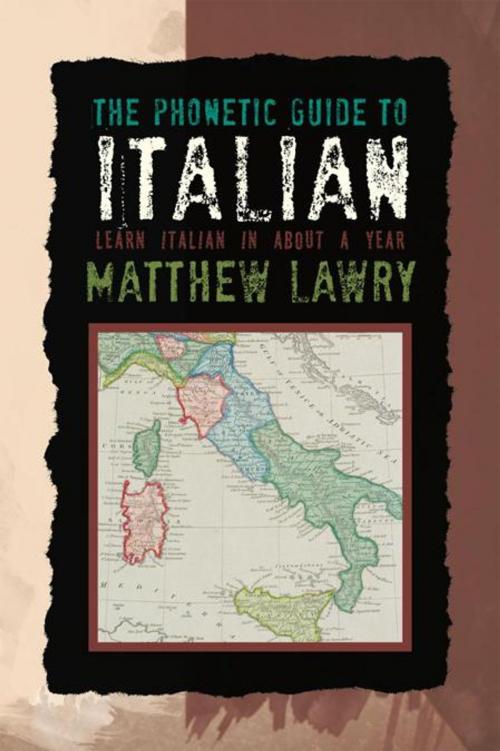The Phonetic Guide to Italian
Learn Italian in About a Year
Nonfiction, Reference & Language, Foreign Languages, Italian| Author: | Matthew Lawry | ISBN: | 9781477219270 |
| Publisher: | AuthorHouse UK | Publication: | July 27, 2012 |
| Imprint: | AuthorHouse UK | Language: | English |
| Author: | Matthew Lawry |
| ISBN: | 9781477219270 |
| Publisher: | AuthorHouse UK |
| Publication: | July 27, 2012 |
| Imprint: | AuthorHouse UK |
| Language: | English |
This book is about learning the phrases and sentences and getting to grips with saying the language without going into the grammar first. In that way, you can have fun learning how to say certain things and also you do not come up against stumbling blocks and frustrations. The idea behind this thinking was because when I was a child, my parents used to tell me words before they taught me how to learn the alphabet, so I thought that was a better way round: get used to the language first. I wrote this book to how I thought the student of the language could assimilate and understand it and get a basic grounding of the language. I thought to myself, what was the best thing to learn first, for instance; what the differences between masculine and feminine are; what does the accent mean, so I put this information in the chapter header pages so then I could use more space to actually learn the language. I have also put in a conceptual stage, so then you can think about the language for instance. English has quite a few routes to it, like Latin, so quite a few words are very similar, even though the accent can throw us off. It sounds like proper English for instance: disgraceful, which means scandaloso in Italian, which is nearly the same in English. I believe there is no right or wrong way to learn; it depends on what you want it for. You may want to practise it on holidays, or you may want to read the Italian newspapers, so sometimes you do not necessarily have to learn the alphabet or the grammar. I like to read newspapers on holidays and watch films in Italian; that is why I wanted to learn it. It can also be useful in attaining knowledge for quizzes. The only good criticism is a constructive one, not a destructive one. Matthew Lawry. I hope you enjoy this book as much as I have in writing it.
This book is about learning the phrases and sentences and getting to grips with saying the language without going into the grammar first. In that way, you can have fun learning how to say certain things and also you do not come up against stumbling blocks and frustrations. The idea behind this thinking was because when I was a child, my parents used to tell me words before they taught me how to learn the alphabet, so I thought that was a better way round: get used to the language first. I wrote this book to how I thought the student of the language could assimilate and understand it and get a basic grounding of the language. I thought to myself, what was the best thing to learn first, for instance; what the differences between masculine and feminine are; what does the accent mean, so I put this information in the chapter header pages so then I could use more space to actually learn the language. I have also put in a conceptual stage, so then you can think about the language for instance. English has quite a few routes to it, like Latin, so quite a few words are very similar, even though the accent can throw us off. It sounds like proper English for instance: disgraceful, which means scandaloso in Italian, which is nearly the same in English. I believe there is no right or wrong way to learn; it depends on what you want it for. You may want to practise it on holidays, or you may want to read the Italian newspapers, so sometimes you do not necessarily have to learn the alphabet or the grammar. I like to read newspapers on holidays and watch films in Italian; that is why I wanted to learn it. It can also be useful in attaining knowledge for quizzes. The only good criticism is a constructive one, not a destructive one. Matthew Lawry. I hope you enjoy this book as much as I have in writing it.















